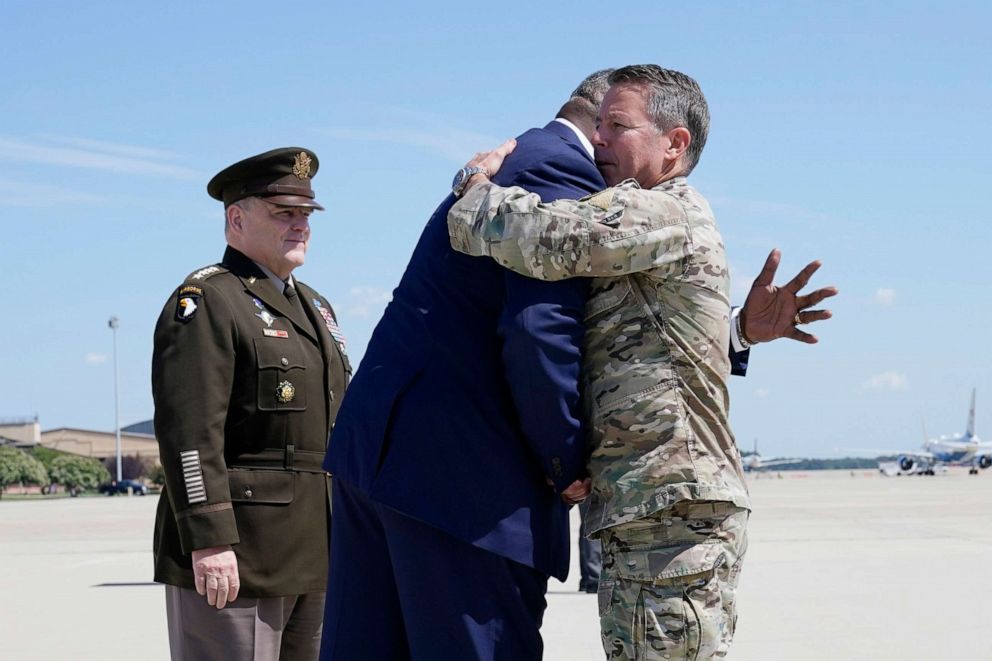Biden administration to begin evacuating Afghans who aided US in late July
Biden has said all U.S. troops will be out of Afghanistan by Aug. 31.
The Biden administration will begin evacuation flights in late July for Afghans who have aided the U.S. military and diplomatic missions, according to a senior administration official.
President Joe Biden earlier this month said all U.S. combat forces will be out of Afghanistan by Aug. 31 and defended his decision to leave the country in the face of Taliban gains in the area.
The top U.S. general in Afghanistan, Scott Miller, returned from Afghanistan to Joint Base Andrews on Wednesday after he handed over his command at a ceremony in Kabul on Monday.

The evacuation effort, dubbed Operation Allies Refuge, will relocate Afghans who have applied for a U.S. Special Immigrant Visa and their families to a safe third country, but it is still unclear how many of these translators, guides and other contractors will be moved and to exactly where.
"Our objective is to get individuals who are eligible relocated, out of the country, in advance of the removal -- of the withdrawal of troops at the end of August," White House press secretary Jen Psaki said Wednesday.
The administration also has not specified when flights will depart, citing security concerns, but the senior administration official told ABC News that they will meet Biden's commitment to begin flights by late July.
"Our message to those women and men is clear: There is a home for you in the United States if you so choose, and we will stand with you just as you stood with us," Biden said in an address on Afghanistan on Thursday.
Earlier this month, a U.S. official told ABC News that Kazakhstan, Uzbekistan and Tajikistan -- Afghanistan's neighbors to the north -- have all been under consideration as third-country options, while a second official said the list includes the United Arab Emirates and Qatar, both of which are home to U.S. military facilities where Afghans could be brought.
Pentagon spokesperson John Kirby confirmed that the administration is also now considering using U.S. military installations in the continental U.S. "for short-term use," as well as U.S. military installations in other countries that have "appropriate temporary residences and associated support infrastructure," he said.
At this point in time, however, no final decision has been made yet, Kirby added.
This week, the president's homeland security adviser Dr. Elizabeth Sherwood-Randall and Zalmay Khalilzad, the special representative for Afghanistan, are leading a delegation to Uzbekistan to discuss security and economic development opportunities for Afghanistan and other countries in the region, the White House announced Wednesday.
There are approximately 18,000 Afghans who have applied for Special Immigrant Visas, with many of them now fearing for their lives as the Taliban gain more districts in a summer offensive against the Afghan government. Within that group, 9,000 still have to complete their applications while the other half are having their cases adjudicated now, according to a State Department spokesperson.
At least 300 Afghan interpreters have been killed since 2014 because they worked for the U.S., according to the advocacy group No One Left Behind, although the Taliban have said in recent weeks that they will not harm them as they pursue power.
In April, Biden announced the withdrawal of all remaining U.S. forces from Afghanistan before the 20th anniversary of the Sept. 11 attacks that brought them there -- although last Thursday he bumped that deadline up to Aug. 31.
But as U.S. and NATO forces exit, the Taliban have seized dozens of districts in a summer offensive that has killed hundreds of Afghan service members or seen them surrender. The Pentagon said this week it seems apparent the militant group is intent on taking power by force, even as the State Department calls for them to return to negotiations with the Afghan government, hosted by Qatar in its capital Doha.
The Biden administration has tried to reinvigorate those talks, which have been all but dead since the two sides agreed on an agenda late last year.
The senior administration official said Wednesday that the U.S. "remains confident that Afghanistan's Armed Forces have the tools and capability to defend their country and that the conflict will ultimately have to be resolved at the negotiating table."
But advocates say that time is running out for these Afghan interpreters and other contractors, while analysts warn that the country could be headed for civil war. The United Nations refugee agency warned Tuesday that the country is facing "imminent humanitarian crisis," calling for an urgent end to violence.
The White House's announcement Wednesday is "a vital step forward in honoring the promise we made to Afghan allies who faithfully served our mission," said Krish O'Mara Vignarajah, president and CEO of Lutheran Immigration and Refugee Service, one of the country's largest refugee resettlement agencies.
But "there are still far too many questions left unanswered, including who exactly and how many people are eligible for evacuation," she added. "With partners estimating that 49% of those at risk reside outside of Kabul, how will those outside the capital access safety?"




